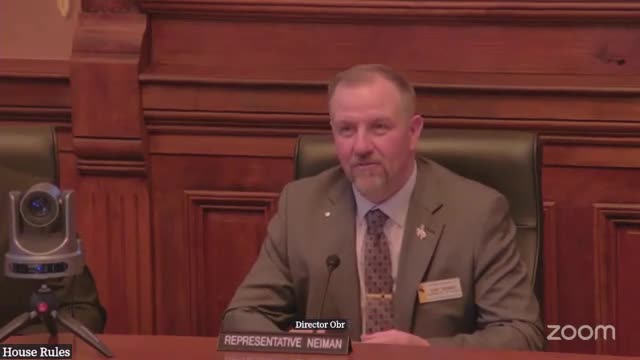Rules committee sponsors new push‑button electronic voting rule contingent on passage and installation of HB158
Get AI-powered insights, summaries, and transcripts
Subscribe
Summary
The committee voted to sponsor a draft House Rule (HR001) that would require recorded votes via an electronic 'push-button' system for most motions once House Bill 158 is enacted and an operational system is installed; members aired security, attendance, and practical concerns during extended debate.
The House Rules & Procedure Committee voted to sponsor a proposed rule (HR001) that would require recorded votes to be cast through an electronic push-button voting system administered by the chief clerk, contingent on enactment of House Bill 158 and installation of an operational system before the 2026 session.
Director Matt Obrecht summarized the draft's key provisions: recorded votes would be displayed in the chamber and on the legislature's streaming platform; once a vote is called, it would remain open for two minutes with announcements at one minute and 30 seconds; certain procedural motions (for example, motions to adjourn and recess) would be excluded from push-button requirement; and the rule would be effective only if HB158 is enacted and an operational voting system is installed prior to the 2026 session.
The committee held extended discussion about the effect of broadening recorded votes to Committee of the Whole and other motions. Representative Harshman and others expressed concerns about ‘‘push-button’’ integrity (who actually presses a desk button), members being away from desks during votes, time impacts of more recorded votes, and whether recorded votes should default to a particular recorded answer if a member is present but does not press a button. Representative Bair (the bill bringer) and Director Obrecht said HB158 addresses security and that the chief clerk would announce warnings during the vote window and could accept an oral vote entry if a member experienced technical problems.
Members debated and proposed several amendments to HR001 during the committee meeting. Representative Harshman offered an amendment to limit mandatory recorded voting to Committee of the Whole and retain the current push-button language for desk or kiosk voting later; that amendment to the amendment failed. After additional debate and a separate motion, the committee voted to sponsor HR001 as drafted (the transcript records the motion as carried by voice vote). Committee discussion identified multiple follow-up items and suggested an interim study to address implementation details if HB158 becomes law.
The committee also discussed operational matters: how to display votes to the public on the legislature's YouTube stream, the ability to change votes before the chief clerk announces the vote closed, contingency procedures for power or equipment failure, and options such as swipe cards or biometric/facial recognition to authenticate voting. The committee recorded the motion to sponsor HR001 as carried; no roll-call tally was taken in committee.
